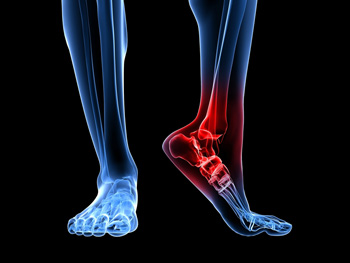Items filtered by date: August 2020
When Should I Replace My Running Shoes?
 Whether you’re just starting out or are an experienced runner, it is important that you have the proper footwear for the style of running that you enjoy. Most running shoes can last about 400 miles, however if you’re running on rugged, uneven, or rough terrain, it is possible that they may experience wear and tear earlier on. Your particular type of running stride can also play a role in wearing down your running shoes. Tracking your miles while you run, and inspecting the state of your shoes before starting your activity, can help you to recognize if your shoes need to be replaced. You may also notice your knees and feet may ache after a run if your shoes are too used, and the support they once gave is now lacking. For more advice on caring for your running shoes and knowing when to replace them, please speak with a podiatrist.
Whether you’re just starting out or are an experienced runner, it is important that you have the proper footwear for the style of running that you enjoy. Most running shoes can last about 400 miles, however if you’re running on rugged, uneven, or rough terrain, it is possible that they may experience wear and tear earlier on. Your particular type of running stride can also play a role in wearing down your running shoes. Tracking your miles while you run, and inspecting the state of your shoes before starting your activity, can help you to recognize if your shoes need to be replaced. You may also notice your knees and feet may ache after a run if your shoes are too used, and the support they once gave is now lacking. For more advice on caring for your running shoes and knowing when to replace them, please speak with a podiatrist.
If you are a runner, wearing the right running shoe is essential. For more information, contact Dr. Odin De Los Reyes from Connecticut. Our doctor can provide the care you need to keep you pain-free and on your feet.
Choosing the Right Running Shoe for Your Foot Type
To increase performance and avoid the risk of injury, it is important to choose the right running shoe based on your foot type. The general design of running shoes revolves around pronation, which is how the ankle rolls from outside to inside when the foot strikes the ground.
- Neutral runners are able to choose from a wide variety of shoes, including minimalist shoes or even going barefoot.
- Runners who overpronate, or experience an over-abundance of ankle rolling, should choose shoes that provide extra motion control and stability.
- Runners who underpronate, or supinate, have feet that have high arches and lack flexibility, preventing shock absorption. They require shoes with more flexibility and cushion.
If you have any questions please feel free to contact our offices located in Southbury and Farmington, CT . We offer the newest diagnostic and treatment technologies for all your foot and ankle needs.
Possible Causes of Plantar Fasciitis
 There is a portion of tissue that is located on the bottom of the foot that is known as the plantar fascia. It connects the heel to the toes, and a healthy plantar fascia is crucial in performing daily functions. There are certain activities that can cause the condition that is referred to as plantar fasciitis, and this can cause severe pain and discomfort. Plantar fasciitis can gradually develop as a result of standing on hard surfaces for the majority of the day, or it may come from wearing shoes that do not fit correctly. Many people who enjoy running may experience this type of foot condition, and it may happen from consistent pressure that is put on the heels. If you have developed plantar fasciitis, it is suggested that you seek the counsel of a podiatrist who can properly treat this condition.
There is a portion of tissue that is located on the bottom of the foot that is known as the plantar fascia. It connects the heel to the toes, and a healthy plantar fascia is crucial in performing daily functions. There are certain activities that can cause the condition that is referred to as plantar fasciitis, and this can cause severe pain and discomfort. Plantar fasciitis can gradually develop as a result of standing on hard surfaces for the majority of the day, or it may come from wearing shoes that do not fit correctly. Many people who enjoy running may experience this type of foot condition, and it may happen from consistent pressure that is put on the heels. If you have developed plantar fasciitis, it is suggested that you seek the counsel of a podiatrist who can properly treat this condition.
Plantar fasciitis can be very painful and inconvenient. If you are experiencing heel pain or symptoms of plantar fasciitis, contact Dr. Odin De Los Reyes from Connecticut. Our doctor can provide the care you need to keep you pain-free and on your feet.
What Is Plantar Fasciitis?
Plantar fasciitis is the inflammation of the thick band of tissue that runs along the bottom of your foot, known as the plantar fascia, and causes mild to severe heel pain.
What Causes Plantar Fasciitis?
- Excessive running
- Non-supportive shoes
- Overpronation
- Repeated stretching and tearing of the plantar fascia
How Can It Be Treated?
- Conservative measures – anti-inflammatories, ice packs, stretching exercises, physical therapy, orthotic devices
- Shockwave therapy – sound waves are sent to the affected area to facilitate healing and are usually used for chronic cases of plantar fasciitis
- Surgery – usually only used as a last resort when all else fails. The plantar fascia can be surgically detached from the heel
While very treatable, plantar fasciitis is definitely not something that should be ignored. Especially in severe cases, speaking to your doctor right away is highly recommended to avoid complications and severe heel pain. Your podiatrist can work with you to provide the appropriate treatment options tailored to your condition.
If you have any questions please feel free to contact our offices located in Southbury and Farmington, CT . We offer the newest diagnostic and treatment technologies for all your foot and ankle needs.
Do Your Child's Feet Hurt?
Podiatrists and Diabetic Patients
 Research has shown the importance of diabetic patients paying close attention to their feet. The elevated sugar levels that can cause diabetes may produce numbing sensations in their feet, and existing cuts, bruises, and wounds may be difficult to feel. If left untreated, infections may develop, and in severe cases amputation may be necessary. There are methods that can be implemented which may help protect the feet of diabetic patients. Circulation may improve when smoking is stopped. Additionally, the feet will feel better when they are washed and dried daily, followed by applying a moisturizer, which may help to prevent cracked heels. It is strongly recommended that diabetic patients be under the care of a podiatrist who can properly manage this condition.
Research has shown the importance of diabetic patients paying close attention to their feet. The elevated sugar levels that can cause diabetes may produce numbing sensations in their feet, and existing cuts, bruises, and wounds may be difficult to feel. If left untreated, infections may develop, and in severe cases amputation may be necessary. There are methods that can be implemented which may help protect the feet of diabetic patients. Circulation may improve when smoking is stopped. Additionally, the feet will feel better when they are washed and dried daily, followed by applying a moisturizer, which may help to prevent cracked heels. It is strongly recommended that diabetic patients be under the care of a podiatrist who can properly manage this condition.
Diabetic foot care is important in preventing foot ailments such as ulcers. If you are suffering from diabetes or have any other concerns about your feet, contact Dr. Odin De Los Reyes from Connecticut. Our doctor can provide the care you need to keep you pain-free and on your feet.
Diabetic Foot Care
Diabetes affects millions of people every year. The condition can damage blood vessels in many parts of the body, especially the feet. Because of this, taking care of your feet is essential if you have diabetes, and having a podiatrist help monitor your foot health is highly recommended.
The Importance of Caring for Your Feet
- Routinely inspect your feet for bruises or sores.
- Wear socks that fit your feet comfortably.
- Wear comfortable shoes that provide adequate support.
Patients with diabetes should have their doctor monitor their blood levels, as blood sugar levels play such a huge role in diabetic care. Monitoring these levels on a regular basis is highly advised.
It is always best to inform your healthcare professional of any concerns you may have regarding your feet, especially for diabetic patients. Early treatment and routine foot examinations are keys to maintaining proper health, especially because severe complications can arise if proper treatment is not applied.
If you have any questions please feel free to contact our offices located in Southbury and Farmington, CT . We offer the newest diagnostic and treatment technologies for all your foot and ankle needs.
Heel Pain 101
 The heel is designed to absorb the impact of body weight, and when pain develops, it can be disabling and affect other aspects of the body and life. Heel pain is usually the result of small repetitive injuries that are unable to heal, which then form into a bigger mechanical issue. These issues can include plantar fasciitis, heel bumps, tarsal tunnel syndrome, a fracture, Achilles tendonitis or heel spurs. Some self-care options for heel pain include wearing comfortable shoes, wearing shoes with good cushioning, minimizing walking on hard surfaces, or losing weight. If heel pain lasts longer than a few weeks, it is important to consult with a podiatrist in case the injury is more severe. A podiatrist will be able to properly diagnose and treat the source of the heel pain.
The heel is designed to absorb the impact of body weight, and when pain develops, it can be disabling and affect other aspects of the body and life. Heel pain is usually the result of small repetitive injuries that are unable to heal, which then form into a bigger mechanical issue. These issues can include plantar fasciitis, heel bumps, tarsal tunnel syndrome, a fracture, Achilles tendonitis or heel spurs. Some self-care options for heel pain include wearing comfortable shoes, wearing shoes with good cushioning, minimizing walking on hard surfaces, or losing weight. If heel pain lasts longer than a few weeks, it is important to consult with a podiatrist in case the injury is more severe. A podiatrist will be able to properly diagnose and treat the source of the heel pain.
Many people suffer from bouts of heel pain. For more information, contact Dr. Odin De Los Reyes of Connecticut. Our doctor can provide the care you need to keep you pain-free and on your feet.
Causes of Heel Pain
Heel pain is often associated with plantar fasciitis. The plantar fascia is a band of tissues that extends along the bottom of the foot. A rip or tear in this ligament can cause inflammation of the tissue.
Achilles tendonitis is another cause of heel pain. Inflammation of the Achilles tendon will cause pain from fractures and muscle tearing. Lack of flexibility is also another symptom.
Heel spurs are another cause of pain. When the tissues of the plantar fascia undergo a great deal of stress, it can lead to ligament separation from the heel bone, causing heel spurs.
Why Might Heel Pain Occur?
- Wearing ill-fitting shoes
- Wearing non-supportive shoes
- Weight change
- Excessive running
Treatments
Heel pain should be treated as soon as possible for immediate results. Keeping your feet in a stress-free environment will help. If you suffer from Achilles tendonitis or plantar fasciitis, applying ice will reduce the swelling. Stretching before an exercise like running will help the muscles. Using all these tips will help make heel pain a condition of the past.
If you have any questions please contact our offices located in Southbury and Farmington, CT . We offer the newest diagnostic and treatment technologies for all your foot and ankle needs.
Can Ingrown Toenails Be Prevented in Children?
 Research has shown the importance of practicing proper foot care beginning in the childhood years. The feet are considered to be the foundation of the body, and strong, healthy feet are important to have and maintain as the aging process occurs. It is beneficial to measure the child’s foot approximately every three months, which is helpful in determining the correct shoe size. When shoes are purchased, it is important to ensure that there is adequate room for the toes to move freely. When the toenails are trimmed, ingrown toenails may be prevented by cutting toenails straight across. If you would like additional information about teaching proper foot care to children, please confer with a podiatrist.
Research has shown the importance of practicing proper foot care beginning in the childhood years. The feet are considered to be the foundation of the body, and strong, healthy feet are important to have and maintain as the aging process occurs. It is beneficial to measure the child’s foot approximately every three months, which is helpful in determining the correct shoe size. When shoes are purchased, it is important to ensure that there is adequate room for the toes to move freely. When the toenails are trimmed, ingrown toenails may be prevented by cutting toenails straight across. If you would like additional information about teaching proper foot care to children, please confer with a podiatrist.
The health of a child’s feet is vital to their overall well-being. If you have any questions regarding foot health, contact Dr. Odin De Los Reyes of Connecticut. Our doctor can provide the care you need to keep you pain-free and on your feet.
Tips for Keeping Children's Feet Healthy
- Make sure their shoes fit properly
- Look for any signs of in-toeing or out-toeing
- Check to see if they have Clubfoot (condition that affects your child’s foot and ankle, twisting the heel and toes inward) which is one of the most common nonmajor birth defects.
- Lightly cover your baby’s feet (Tight covers may keep your baby from moving their feet freely, and could prevent normal development)
- Allow your toddler to go shoeless (Shoes can be restricting for a young child’s foot)
- Cut toenails straight across to avoid ingrown toenails
- Keep your child’s foot clean and dry
- Cover cuts and scrapes. Wash any scratches with soap and water and cover them with a bandage until they’ve healed.
If you have any questions, please feel free to contact our offices located in Southbury and Farmington, CT . We offer the newest diagnostic and treatment technologies for all your foot care needs.

